译林牛津初一上册英语知识点归纳
译林版牛津英语七年级上册期末复习知识点
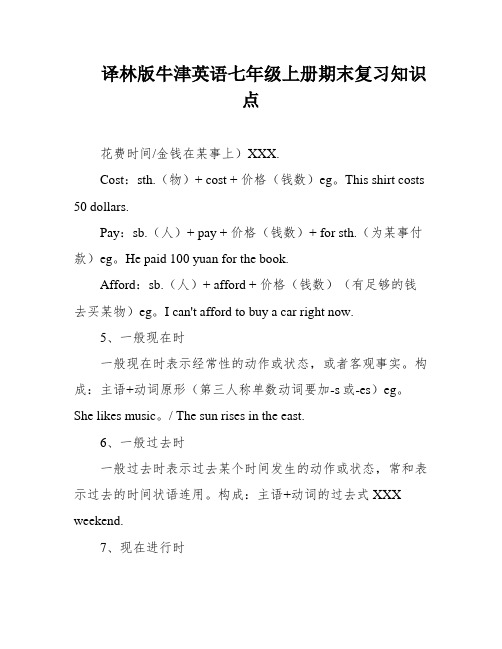
译林版牛津英语七年级上册期末复习知识点花费时间/金钱在某事上)XXX.Cost:sth.(物)+ cost + 价格(钱数)eg。
This shirt costs 50 dollars.Pay:sb.(人)+ pay + 价格(钱数)+ for sth.(为某事付款)eg。
He paid 100 yuan for the book.Afford:sb.(人)+ afford + 价格(钱数)(有足够的钱去买某物)eg。
I can't afford to buy a car right now.5、一般现在时一般现在时表示经常性的动作或状态,或者客观事实。
构成:主语+动词原形(第三人称单数动词要加-s或-es)eg。
She likes music。
/ The sun rises in the east.6、一般过去时一般过去时表示过去某个时间发生的动作或状态,常和表示过去的时间状语连用。
构成:主语+动词的过去式XXX weekend.7、现在进行时现在进行时表示现在正在进行的动作,常和now。
XXX。
currently等时间状语连用。
构成:主语+be动词(am/is/are)+动词-XXX.8、一般将来时一般将来时表示将来某个时间要发生的动作或状态,常和表示将来的时间状语连用。
构成:主语+will/shall+动词原形eg。
I will go to Beijing next month。
/ She shall visit her XXX.9、情态动词情态动词有can/could。
may/might。
must。
shall/should。
will/would。
ought to等。
它们的用法有所不同,但都表示某种语气或情态。
eg。
You should study hard for the exam。
/ She must be at home now.10、被动语态被动语态表示动作的承受者在句子中作主语,动作的执行者在句子中用by引出。
牛津译林版七年级上英语期末复习全册知识点归纳
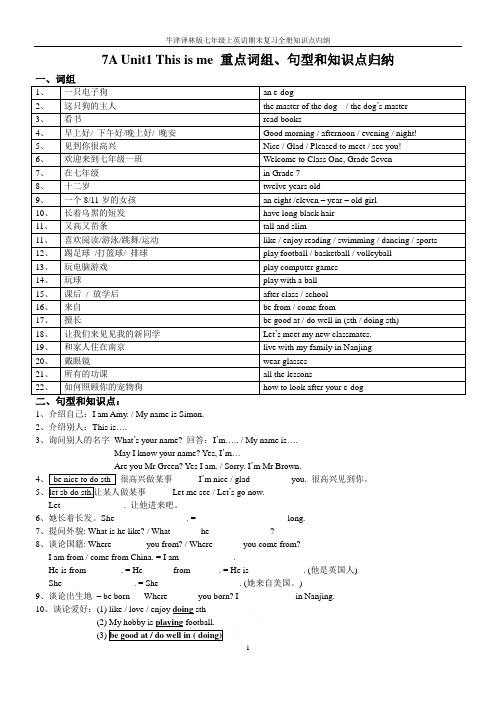
7A Unit1 This is me 重点词组、句型和知识点归纳1、介绍自己:I am Amy. / My name is Simon.2、介绍别人:This is….3、询问别人的名字What’s your name? 回答:I’m….. / My name is….May I know your name? Yes, I’m…Are you Mr Green? Yes I am. / Sorry. I’m Mr Brown.4很高兴做某事I’m nice / glad _________you. 很高兴见到你。
5Let me see / Let’s go now.Let ______________. 让他进来吧。
6、她长着长发。
She _____ _____ _____. = _______ ______ ______ long.7、提问外貌: What is he like? / What ______ he ______ _______?8、谈论国籍: Where _______ you from? / Where ______ you come from?I am from / come from China. = I am ____________.He is from _______ . = He ______ from ______. = He is ____________. (他是英国人)She ________________. = She __________________. (她来自美国。
)9、谈论出生地–10、谈论爱好:She is good at swimming. = She does well in dancing. = She ______ ______.= She is a _____ _______.注意do well in 的否定句例如:他不擅长跳舞。
Unit1知识点梳理2023-2024学年牛津译林版英语七年级上册

第一讲 7A Unit1 Language Point 梳理一.Unit 1 重点语法1.would like / love sth.想要某物例句:Would you like some water?肯定回答:Yes, please. Yes, I’d like / love to.否定回答:No, thanks.2.would like / love to do sth.想要做某事例句:Would you like to drink some water?肯定回答: Yes, I’d like / love to.否定回答:I’d like / love to, but …… .3.糖葫芦形容词结构:数词+ 名词(单数) + (形容词)例:80foothigh 80 英尺高fiveinchtall 5英寸高的7yearold 7岁的注意:①名词必须用单数②只能放在名词前作定语,不能放在be 动词后作表语。
4.read/look/see/watch几个“看”的用法和区别:look 强调看的动作①系动词。
译作看起来,后接形容词。
She looks happy.②不及物动词。
译作看,词组:look at…,用副词修饰。
Tom looked at me angrily.see 及物动词,译作看到,无进行时态,强调看的结果。
watch 及物动词,译作观看,注视。
强调观看正在进行中的,发生变化的活动过程,常用于看电视、看球赛、看演出等。
read 及物动词,译作阅读。
强调看文字内容的东西,常用于看书、看报纸、看杂志等。
5.疑问代词what、which、who 及疑问副词how、when 、where可以和动词不定式连用。
what to do 做什么which to do 做哪个who to do 如何做how to do 谁做when to do 什么时候做where to do 在哪里做6.“疑问词+ to do” 结构经常放在know,learn,see ,ask等动词后做宾语。
牛津译林版七年级上英语知识点总结
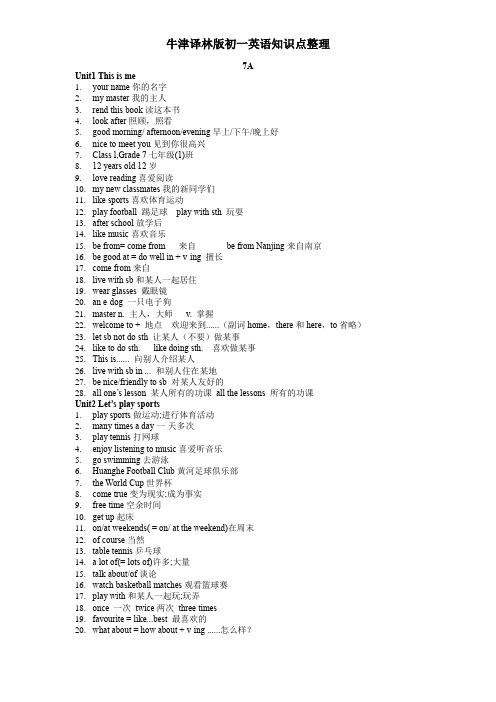
7AUnit1 This is me1.your name你的名字2.my master我的主人3.rend this book读这本书4.look after照顾,照看5.good morning/ afternoon/evening早上/下午/晚上好6.nice to meet you见到你很高兴7.Class l,Grade 7七年级(1)班8.12 years old 12岁9.love reading喜爱阅读10.my new classmates我的新同学们11.like sports喜欢体育运动12.play football 踢足球play with sth 玩耍13.after school放学后14.like music喜欢音乐15.be from= come from 来自be from Nanjing来自南京16.be good at = do well in + v-ing 擅长e from来自18.live with sb和某人一起居住19.wear glasses 戴眼镜20.an e-dog 一只电子狗21.master n. 主人,大师v. 掌握22.welcome to + 地点欢迎来到......(副词home,there和here,to省略)23.let sb not do sth 让某人(不要)做某事24.like to do sth. like doing sth. 喜欢做某事25.This is...... 向别人介绍某人26.live with sb in ... 和别人住在某地27.be nice/friendly to sb 对某人友好的28.all one’s lesson 某人所有的功课all the lessons 所有的功课Unit2 Let’s play sports1.play sports做运动;进行体育活动2.many times a day一-天多次3.play tennis打网球4.enjoy listening to music喜爱听音乐5.go swimming去游泳6.Huanghe Football Club黄河足球俱乐部7.the World Cup世界杯e true变为现实;成为事实9.free time空余时间10.get up起床11.on/at weekends( = on/ at the weekend)在周末12.of course当然13.table tennis乒乓球14. a lot of(= lots of)许多;大量15.talk about/of谈论16.watch basketball matches观看篮球赛17.play with和某人一起玩;玩弄18.once 一次twice两次three times19.favourite = like...best 最喜欢的20.what about = how about + v-ing ......怎么样?21.be a member of = be in 成为......其中的一员22.look +adj look at + adv23.in one’s free/spare time 在某人的空闲时间24.enjoy doing sth 喜欢做某事25.make sb. do sth.使/让某人做某事make sb./sth. + adj.使某人/某物处于.....状态26.want to do sth = would like to do sth 想要做某事27.hope to do sth 希望做某事hope sb will/can do sth 希望某人做某事没有hope sb to do sth28.talk with sb about sth 和某人谈论某事29.fun 不可数名词funny 有趣的have fun +v-ing 做某事玩得愉快30.feel + adj31.reading is fun. 动名词作主语,谓语动词用单数形式。
(完整版)新译林版七年级上册英语全册知识点归纳总结
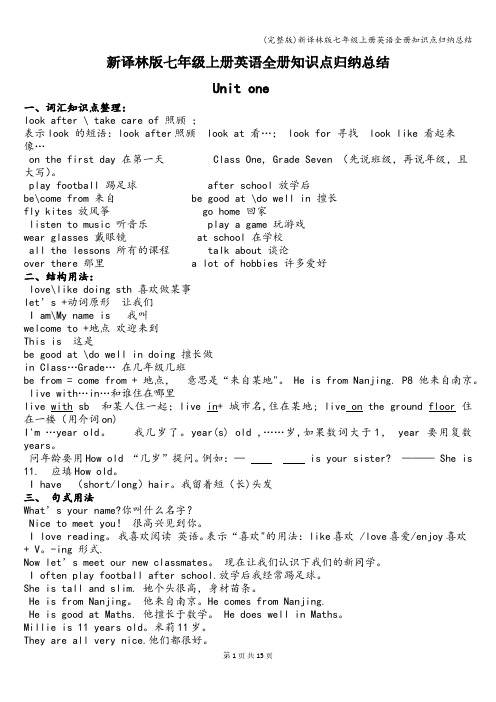
新译林版七年级上册英语全册知识点归纳总结Unit one一、词汇知识点整理:look after \ take care of 照顾 ;表示look 的短语:look after照顾 look at 看…; look for 寻找 look like 看起来像…on the first day 在第一天 Class One, Grade Seven (先说班级,再说年级,且大写)。
play football 踢足球 after school 放学后be\come from 来自 be good at \do well in 擅长fly kites 放风筝 go home 回家listen to music 听音乐 play a game 玩游戏 wear glasses 戴眼镜 at school 在学校all the lessons 所有的课程 talk about 谈论 over there 那里 a lot of hobbies 许多爱好二、结构用法:love\like doing sth 喜欢做某事let’s +动词原形 让我们I am\My name is 我叫welcome to +地点 欢迎来到This is 这是be good at \do well in doing 擅长做in Class…Grade… 在几年级几班be from = come from + 地点, 意思是“来自某地"。
He is from Nanjing. P8 他来自南京。
live with…in…和谁住在哪里live with sb 和某人住一起;live in+ 城市名,住在某地; live on the ground floor 住在一楼(用介词on)I'm …year old。
我几岁了。
year(s) old ,……岁,如果数词大于1, year 要用复数years。
问年龄要用How old “几岁”提问。
译林牛津初一上册英语知识点归纳

初一英语Unit 1 This is me!短语归纳:look after \ take care of照顾on the first day在第一天Class 1,Grade 7 7年级1班play football踢足球after school放学后be\come from来自be good at \do well in擅长fly kite s 放风筝go home 回家listen to music听音乐play a game玩游戏wear glasses戴眼镜at school在学校all the lessons所有的课程talk about谈论over there那里a lot of hobbies许多爱好用法集萃:love\like doing sth喜欢做某事let’s +动词原形让我们I am\My name is我叫welcome to +地点欢迎来到This is这是be good at \do well in doing擅长做in Class Grade在几年级几班live with in 和谁住在哪里I ’ m year old.我几岁了。
I have hair.我留着头发典句背诵What’s your name ?你叫什么名字?Nice to meet you!很高兴见到你。
I love reading.我喜欢阅读Now let ’s meet our new classmates.现在让我们认识下我们的新同学。
I often play football after school.放学后我经常踢足球。
She is tall and slim.她个头很高,身材苗条。
He is from Nanjing.他来自南京。
He is good at Maths.他擅长于数学。
Millie is 11 years old.米莉11岁。
They are all very nice.他们都很好。
牛津译林版七年级上册英语Unit1知识点汇总

牛津译林版七年级上册英语Unit1知识点汇总7A Unit 1 This is me!一.【精选短语】1. how to look after your e-dog如何照顾你的电子狗(1)疑问词+动词不定式(2)look after=take care of 照顾,照料2. Good evening.晚上好。
(晚上见面问候语)→比较:Good night.晚安。
(晚上分别时用语)3. love playing football after school喜爱放学后踢足球【知识链接】Love/like doing sth.喜欢做某事,强调习惯上的喜欢;Love/like to do sth.强调的是某一次的行为。
e.g. She loves watching TV, but today she loves to listen to music. Love的用法⑴vt.喜爱e.g. ①He loves his parents. (不能用like代替love)②She loves music.她爱好音乐。
⑵vt.热爱e.g. We love our motherland.我们热爱祖国。
⑶n.爱;挚爱a mother’s love for her children母亲对孩子的爱②fall in love with sb爱上…,e.g. He fell in love with her.③我们可在书信的结尾处看到例如Love Mary这样的署名,意思是With my love, Mary,一方面表示情感,一方面表示道别。
【用法拓展】lovely美丽的;可爱的e.g. lovely hair秀发,a lovely girl美丽的少女4. be good at sth/doing sth=do well in sth/doing sth擅长;在某方面表现好【知识链接】⑴He is good at telling funny jokes.⑵She always does well in English.5. wear glasses戴眼镜→ wear后接服装、装饰品等,表示“穿、戴”。
牛津译林版七年级英语上册Unit-1单元知识点归纳
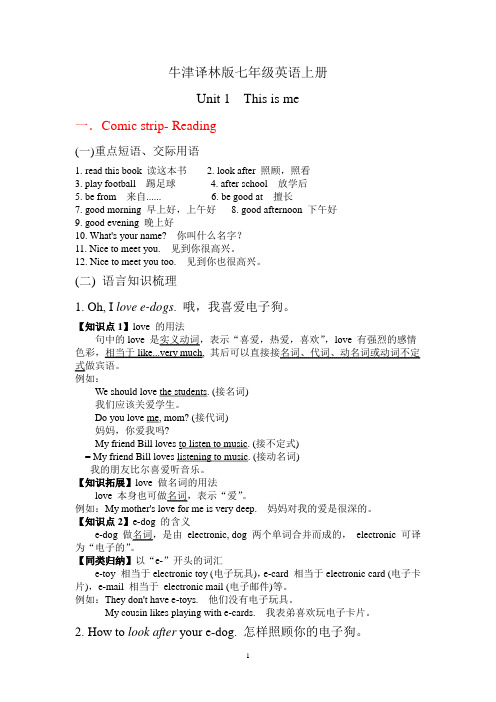
牛津译林版七年级英语上册Unit 1 This is me一.Comic strip- Reading(一)重点短语、交际用语1.read this book 读这本书2. look after 照顾,照看3. play football 踢足球4. after school 放学后5. be from 来自......6. be good at 擅长7. good morning 早上好,上午好8. good afternoon 下午好9. good evening 晚上好10. What's your name? 你叫什么名字?11. Nice to meet you. 见到你很高兴。
12. Nice to meet you too. 见到你也很高兴。
(二) 语言知识梳理1. Oh, I love e-dogs. 哦,我喜爱电子狗。
【知识点1】love 的用法句中的love 是实义动词,表示“喜爱,热爱,喜欢”,love 有强烈的感情色彩,相当于like...very much, 其后可以直接接名词、代词、动名词或动词不定式做宾语。
例如:We should love the students. (接名词)我们应该关爱学生。
Do you love me, mom? (接代词)妈妈,你爱我吗?My friend Bill loves to listen to music. (接不定式)= My friend Bill loves listening to music. (接动名词)我的朋友比尔喜爱听音乐。
【知识拓展】love 做名词的用法love 本身也可做名词,表示“爱”。
例如:My mother's love for me is very deep. 妈妈对我的爱是很深的。
【知识点2】e-dog 的含义e-dog 做名词,是由electronic, dog 两个单词合并而成的,electronic 可译为“电子的”。
牛津译林版英语七年级上册分单元知识点归纳总结(Unit1-8))

牛津译林版英语七年级上册全册知识点归纳总结(最新)Unit one一、词汇知识点整理:look after \ take care of 照顾;表示look 的短语:look after照顾look at 看…;look for 寻找look like 看起来像…on the first day 在第一天Class One, Grade Seven (先说班级,再说年级,且大写)。
play football 踢足球after school 放学后be\come from 来自be good at \do well in 擅长fly kites 放风筝go home 回家listen to music 听音乐play a game 玩游戏wear glasses 戴眼镜at school 在学校all the lessons 所有的课程talk about 谈论over there 那里 a lot of hobbies 许多爱好二、结构用法:love\like doing sth 喜欢做某事let’s +动词原形让我们I am\My name is 我叫welcome to +地点欢迎来到This is 这是be good at \do well in doing 擅长做in Class…Grade…在几年级几班be from = come from + 地点, 意思是“来自某地”。
He is from Nanjing. P8 他来自南京。
live with…in…和谁住在哪里live with sb 和某人住一起;live in+ 城市名,住在某地;live on the ground floor 住在一楼(用介词on)I’m …year old. 我几岁了。
year(s) old ,……岁,如果数词大于1,year 要用复数years. 问年龄要用How old “几岁”提问。
例如:- is your sister? --- She is 11. 应填How old.I have (short/long)hair.我留着短(长)头发三、句式用法What’s your name?你叫什么名字?Nice to meet you! 很高兴见到你。
译林版牛津初中英语七年级上册全册各单元短语、句型归纳整理
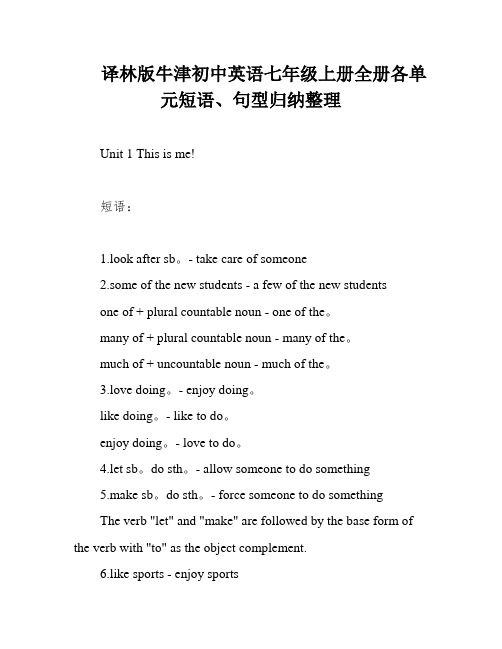
译林版牛津初中英语七年级上册全册各单元短语、句型归纳整理Unit 1 This is me!短语:1.look after sb。
- take care of someone2.some of the new students - a few of the new studentsone of + plural countable noun - one of the。
many of + plural countable noun - many of the。
much of + uncountable noun - much of the。
3.love doing。
- enjoy doing。
like doing。
- like to do。
enjoy doing。
- love to do。
4.let sb。
do sth。
- allow someone to do something5.make sb。
do sth。
- force someone to do somethingThe verb "let" and "make" are followed by the base form of the verb with "to" as the object complement.6.like sports - enjoy sports7.after class - after the classin class - during the class8.be good at (doing)。
- be skilled at (doing)。
9.meet my new friends - meet my new classmates10.over there - in that n11.tell sb。
about sth。
- inform someone about something12.Oh。
牛津译林版七年级英语上册全册知识点归纳汇总
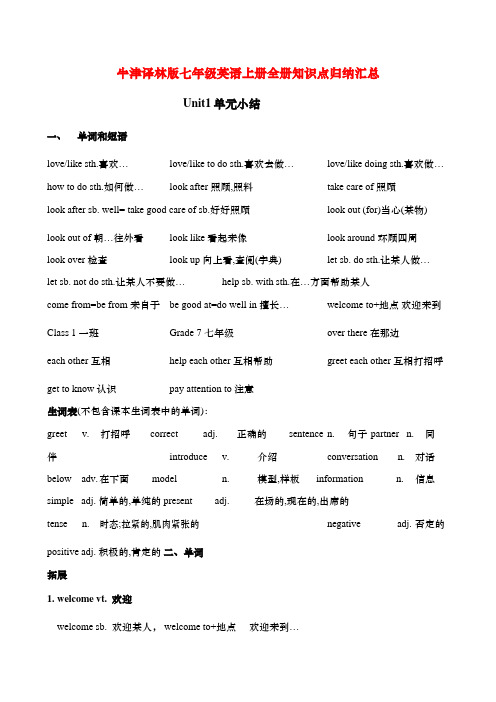
牛津译林版七年级英语上册全册知识点归纳汇总Unit1 单元小结一、单词和短语love/like sth.喜欢…love/like to do sth.喜欢去做…love/like doing sth.喜欢做… how to do sth.如何做…look after 照顾,照料take care of 照顾look after sb. well= take good care of sb.好好照顾look out (for)当心(某物) look out of 朝…往外看look like 看起来像look around 环顾四周look over 检查look up 向上看,查阅(字典) let sb. do sth.让某人做… let sb. not do sth.让某人不要做…help sb. with sth.在…方面帮助某人come from=be from 来自于be good at=do well in 擅长…welcome to+地点欢迎来到Class 1 一班Grade 7 七年级over there 在那边each other 互相help each other 互相帮助greet each other 互相打招呼get to know 认识pay attention to 注意生词表(不包含课本生词表中的单词):greet v. 打招呼 correct adj. 正确的sentence n. 句子 partner n. 同伴introduce v. 介绍conversation n. 对话below adv. 在下面model n. 模型,样板 information n. 信息simple adj. 简单的,单纯的 present adj. 在场的,现在的,出席的tense n. 时态;拉紧的,肌肉紧张的negative adj. 否定的positive adj. 积极的,肯定的二、单词拓展1. welcome vt. 欢迎welcome sb. 欢迎某人, welcome to+地点欢迎来到…You are welcome. 不用谢。
牛津译林版七年级上册英语各单元语法知识点复习提纲(全面!)
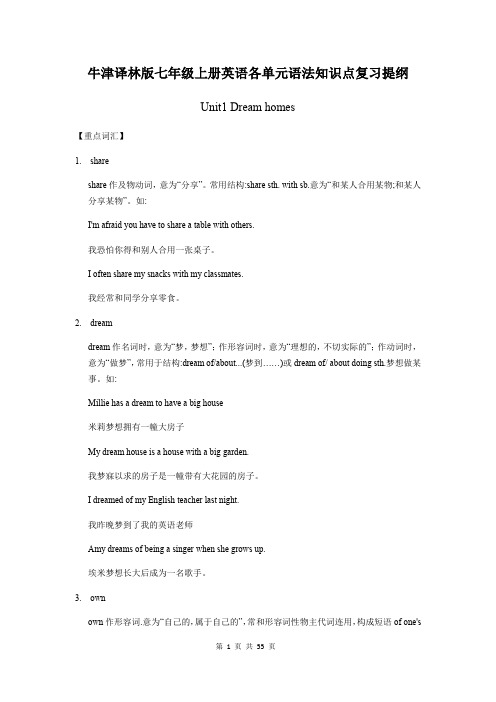
牛津译林版七年级上册英语各单元语法知识点复习提纲Unit1 Dream homes【重点词汇】1. shareshare作及物动词,意为“分享”。
常用结构:share sth. with sb.意为“和某人合用某物;和某人分享某物”。
如:I'm afraid you have to share a table with others.我恐怕你得和别人合用一张桌子。
I often share my snacks with my classmates.我经常和同学分享零食。
2. dreamdream作名词时,意为“梦,梦想”;作形容词时,意为“理想的,不切实际的”;作动词时,意为“做梦”,常用于结构:dream of/about...(梦到……)或dream of/ about doing sth.梦想做某事。
如:Millie has a dream to have a big house米莉梦想拥有一幢大房子My dream house is a house with a big garden.我梦寐以求的房子是一幢带有大花园的房子。
I dreamed of my English teacher last night.我昨晚梦到了我的英语老师Amy dreams of being a singer when she grows up.埃米梦想长大后成为一名歌手。
3. ownown作形容词.意为“自己的,属于自己的”,常和形容词性物主代词连用,构成短语of one'sown,表示“属于某人自己的”,on one's own = alone,意为“独自地”。
own作动词时,表示“拥有”。
如:I have my own computer我有属于我自己的电脑。
That's a car of her own.那是她自己的汽车。
He lives on his own.他一个人生活。
(完整word版)译林牛津七年级上学期英语语法总结

语法复习(七年级上)Ⅰ一般现在时一、何时用一般现在时:1、表示现阶段经常性、习惯性的动作或状态例:I go to school on foot usually. / The trees are green.2、表示个人爱好、习惯例:I like red and pink.3、表示客观真理或自然现象例:Leaves turn yellow in autumn.二、be动词一般现在时:1、be动词一般现在时的肯定句:主语+ am/is/are + …例:I am 13 years old. / We are classmates.2、be动词一般现在时的否定句:主语+ am/is/are + not + …3、be动词一般现在时的一般疑问句:Am/Is/Are + 主语+…回答:肯定:Yes, he is.否定:No, he is not.4、be动词一般现在时的特殊疑问句:疑问词:what/who/which/where/when/why…例:What is it? Where are they?三、行为动词的一般现在时:1、肯定句:(1)主语为第一、第二人称或第三人称复数时,谓语动词用原型例:We have 3 children. / They live far from school.(2)主语为第三人称单数时,行为动词用(-s/ -es)例:He often gets up at 6.2、否定句:(1)主语为第一、第二人称或第三人称复数时,do not +动词原形(2)主语为第三人称单数时,does not +动词原形3、一般疑问句例:Do you go to school today?Yes, I do. / No, I do not.4、特殊疑问句例:When do they have lunch?How many pairs of shoes does she have?ⅡThere be 句型一、含义:有…例:There is some juice in the cup.There are many eggs in the kitchen.二、There be 句型的否定句与疑问句1、否定句:There is/are not …2、疑问句:Is/Are there …?Ⅲ代词一、人称代词二、物主代词例:Is that car yours?回答:Yes, it is mine. / No, it is hers.例:Are these books yours?回答:Yes, they are ours. / No, they are theirs.三、指示代词①作主语:This is a good idea.②作表语:What he wants is this.③作宾语:You like this but I like that.④作定语:What is the use of those books.*指示代词的特殊用法:为了避免重复,可用that/those代替前面提到过的事物,但this/those不用于这种替代。
译林版牛津初中英语七年级上册全册各单元短语、句型归纳整理
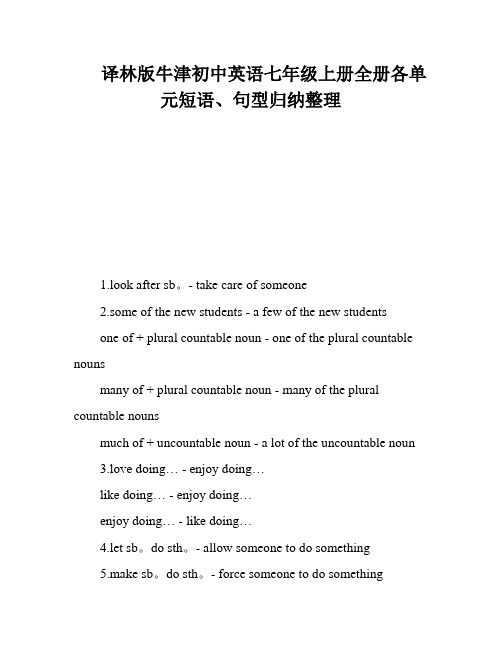
译林版牛津初中英语七年级上册全册各单元短语、句型归纳整理1.look after sb。
- take care of someone2.some of the new students - a few of the new studentsone of + plural countable noun - one of the plural countable nounsmany of + plural countable noun - many of the plural countable nounsmuch of + uncountable noun - a lot of the uncountable noun3.love doing… - enjoy doing…like doing… - enjoy doing…enjoy doing… - like doing…4.let sb。
do sth。
- allow someone to do something5.make sb。
do sth。
- force someone to do somethingThe verb "let" and "make" are followed by the base form of the verb with "to" as the object complement.6.like sports - enjoy sports7.after class - after the classin class - during the class8.be good at (doing)… - excel at (doing)… = do well in (doing)…9.meet my new friends - ___10.over there - at that place11.tell sb。
(完整版)新译林版七年级上册英语全册知识点归纳总结
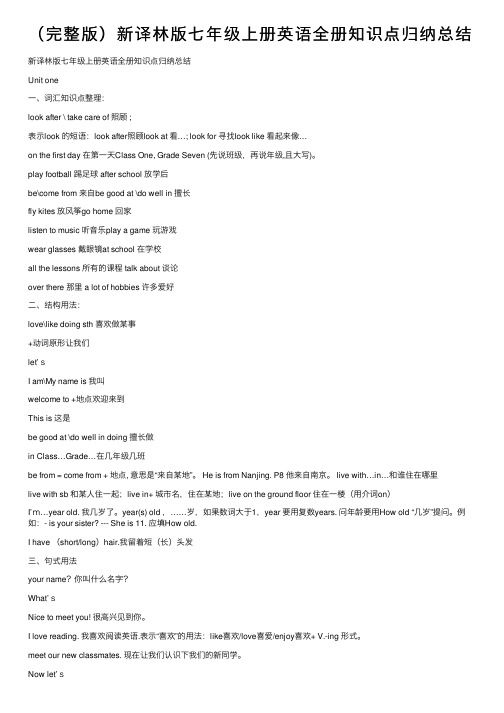
(完整版)新译林版七年级上册英语全册知识点归纳总结新译林版七年级上册英语全册知识点归纳总结Unit one⼀、词汇知识点整理:look after \ take care of 照顾 ;表⽰look 的短语:look after照顾look at 看…; look for 寻找look like 看起来像…on the first day 在第⼀天Class One, Grade Seven (先说班级,再说年级,且⼤写)。
play football 踢⾜球 after school 放学后be\come from 来⾃be good at \do well in 擅长fly kites 放风筝go home 回家listen to music 听⾳乐play a game 玩游戏wear glasses 戴眼镜at school 在学校all the lessons 所有的课程 talk about 谈论over there 那⾥ a lot of hobbies 许多爱好⼆、结构⽤法:love\like doing sth 喜欢做某事+动词原形让我们let’sI am\My name is 我叫welcome to +地点欢迎来到This is 这是be good at \do well in doing 擅长做in Class…Grade…在⼏年级⼏班be from = come from + 地点, 意思是“来⾃某地”。
He is from Nanjing. P8 他来⾃南京。
live with…in…和谁住在哪⾥live with sb 和某⼈住⼀起;live in+ 城市名,住在某地;live on the ground floor 住在⼀楼(⽤介词on)I’m…year old. 我⼏岁了。
year(s) old ,……岁,如果数词⼤于1,year 要⽤复数years. 问年龄要⽤How old “⼏岁”提问。
- 1、下载文档前请自行甄别文档内容的完整性,平台不提供额外的编辑、内容补充、找答案等附加服务。
- 2、"仅部分预览"的文档,不可在线预览部分如存在完整性等问题,可反馈申请退款(可完整预览的文档不适用该条件!)。
- 3、如文档侵犯您的权益,请联系客服反馈,我们会尽快为您处理(人工客服工作时间:9:00-18:30)。
初一英语Unit 1 This is me!短语归纳:look after \ take care of 照顾on the first day 在第一天Class 1,Grade 7 7年级1班play football 踢足球after school 放学后be\come from 来自be good at \do well in 擅长fly kite s 放风筝go home 回家listen to music 听音乐play a game 玩游戏wear glasses 戴眼镜at school 在学校all the lessons 所有的课程talk about 谈论over there 那里a lot of hobbies 许多爱好用法集萃:love\like doing sth 喜欢做某事let’s +动词原形让我们I am\My name is 我叫welcome to +地点欢迎来到This is 这是be good at \do well in doing 擅长做in Class…Grade…在几年级几班live with…in…和谁住在哪里I’m …year old. 我几岁了。
I have…hair.我留着……头发典句背诵What’s your name?你叫什么名字?Nice to meet you! 很高兴见到你。
I love reading. 我喜欢阅读Now let’s meet our new classmates. 现在让我们认识下我们的新同学。
I often play football after school.放学后我经常踢足球。
She is tall and slim. 她个头很高,身材苗条。
He is from Nanjing. 他来自南京。
He is good at Maths. 他擅长于数学。
Millie is 11 years old.米莉11岁。
They are all very nice.他们都很好。
I am good at dancing. 我擅长于跳舞。
语法:连系动词be 的一般现在时动词be 的三变化am is are. 我(I)用am ,你(you)用are ,is 用于他(he)她(she)它(it),单数名词用is,复数名词都用are句型结构:1、肯定句:主语+am\is\are …It is a football.2、否定句:主语+am\is\are+not…It is not a football.3、一般疑问句:Am\Is\Are+主语+其他?Is it a football? 回答Yes, it is. No, it isn’t4、特殊疑问句:疑问句+am/is/are +主语+其他?What’s your name?Unit 2 Let's play sports!短语归纳:play sports 做运动many times a day 一天许多次play football/tennis 踢足球/打网球talk about 谈论after school 放学后go swimming 去游泳a member of …中的一员come from 来自listen to music 听音乐in the next World Cup 在下届世界杯come true 实现in one’s free time 在某人的空闲时间live in 住/生活在read books 看书at/ on weekends=at/on the weekend在周末stay at home 待在家里 a lot of 许多ask sb about sth 问某人某事on TV 在电视上Watch basketball matches 看篮球比赛feel great 感觉特棒用法集萃:What about doing sth ?做…怎么样?Enjoy doing sth 喜欢做某事make sb/sth +adj 使某人/某物make sb to do sth 使某人做某事want to do sth 想要做某事hope to do sth 希望做某事have fun doing sth 做某事开心典句必背I like walking. 我喜欢散步。
I enjoy swimming.What’s your favourite sport? 我喜欢游泳,他最喜欢的运动是什么?I hope his dream comes true. 我希望他梦想成真。
What does Li Hua do in his free time? 李华在业余时间做什么?What else do you want to do? 你还想做什么其他的事情?Reading is fun. 读书是有趣的事情。
语法:行为动词的一般现在时行为动词的一般现在时的构成:主语+行为动词+(其他)当主语为第三人称单数(he, she, it)时,谓语动词也要用单数形式。
用好一般现在时,时间状态需牢记;主语人称是三单,动词要把-s/-es 添;基本用法要记清,状态习惯经常性。
行为动词的一般现在时的变化(1)否定句:主语+ don’t/doesn’t + 动词原形+其他I don’t like bread.He doesn’t often play football.(2)一般疑问句:Do/Does + 主语+动词原形+其他Do you often play football? Yes, I am /No, I am notDoes he often play football? Yes, he does/ No, he doesn’t3、特殊疑问句:特殊疑问句+一般疑问句?When do you go to school? I go to school at seven o’clock.动词的三单形式的变化:动词三单现在时,一般在词尾加SS,x,ch,sh,在词尾,直接加上-es词尾若是字母o ,加上-es 不用愁。
词尾是“辅音字母+y” ,先变y为i, 后边再加-esUnit 3 Welcome to our school!短语归纳:on foot 步行far away from 远离a few 一些,少量learn about 学得,获知would like sth/to do sth 想要/想要做某事after class 下课后on this day 在今天all kinds of 各种各样on the phone 在电话中look at 看ground floor 底层,一楼on the wall 在墙上by bus 乘公共汽车in front of 在……前面let me see 让我看看go to school 去上学reading room 阅览室borrow from 从……借……get to school 到达学校on the Open Day 在开放日用法集萃:Thank you for doing sth 为做某事而感谢你be ready to do sth 准备做某事It takes sb some time to do sth 花费某人多少时间做某事show sb around 领某人参观need to do sth 需要做某事典句必背:Welcome to our school.欢迎来到我们学校。
What’s the date taday?今天几月几号Let’s meet at the school gate at 1:30.让我们1:30 在学校门口会面吧Who’s that man in the white shirt?穿白衬衫的那个男的是谁?There are all kinds of books in our library.在我们图书馆有各种各样的书I’d like to say hello to her.我想向她问好。
Do you borrow books from the library?你从图书馆借书吗?We only have a few classrooms.我们只有几间教室It takes me about an hour to get to school.大约花了我一个小时的时间到达学校。
语法:一、人称代词人称代词主格:作主语,表示谁怎么样了、干什么了。
I am a teacher. You are student. He is a student, too.We/You/They are students.人称代词宾格作宾语,表示动作行为的对象。
Give it to me.??Let’s go (let’s =let us)人称单数复数主格宾格主格宾格第一人称I me we us 第二人称you you you you第三人称he himthey them she herit it二、物主代词表示所有关系的代词叫做物主代词,也可叫做代词所有格。
物主代词分形容词性物主代词和名词性物主代词二种,其人称和数的变化见下表。
数人称类别单数复数第一人称第二人称第三人称第一人称第二人称第三人称形容词性物主代词my your his her its our your their 名词性物主代词mine yours his hers its ours yours theirs汉语我的你的他的她的它的我们的你们的他(她、它)们的形容词性物主代词(my/your/his/her/its/our/their)+名词而名词性物主代词则相单于形容词性物主代词+名词,故其后不必加名词。
如:Is this your book? No,,it isn’t,it’s hers(her book)This pen is mine.人称代词的顺序单数的人称代词为第二人称,第三人称,第一人称(2,3,1)复数的人称代词为第一人称,第二人称,第三人称(1,2,3)Unit 4 My day短语归纳:Wake sb up 叫醒某人go out 出去,熄灭have breakfast/lunch/dinner 吃早中晚饭have fun 玩的开心get up 起床have lessons 上课go to bed 去睡觉be late for 迟到chat with 聊天each other 相互have a good time 玩的开心all the best 一切顺利,万事如意get ready for为……准备好need a good rest 需要好好休息do morning exercise s用法集萃It is time for sth/ to do sth 到该做什么的时间到了。
